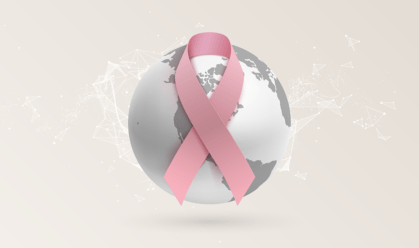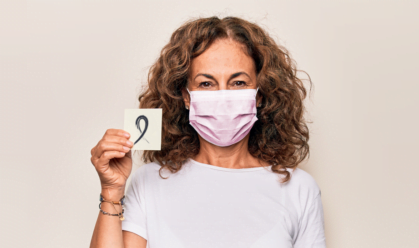Treatments for breast cancer Part II.

Systemic treatment refers to taking medications that affect the entire body in order to kill cancer that may have spread. Systemic treatment methods can be divided into chemotherapy, hormone therapy, targeted therapy and immunotherapy.
Chemotherapy means using drugs to kill cancer cells or prevent their growth.
They can be given orally or administered intravenously. Not all women require chemotherapy. When needed, it can be applied before surgery (neoadjuvant chemotherapy) or after surgery (adjuvant chemotherapy). Both methods also target cancer cells that may have spread but can’t be detected. The first one also helps to shrink the tumor, so it can be removed more easily during surgery. In addition, chemotherapy can be used as the main treatment for advanced cancer.
Hormone therapy, or endocrine therapy is used for certain types of cancer that are hormone-dependent (that grow in response to our hormones, such as oestrogen).
If cancer is found to be fueled by oestrogen, it is called oestrogen receptor positive (ER+). Hormone therapy in that case blocks the effect of oestrogen on cancer cells. All breast cancers are tested for oestrogen receptors. When deemed useful, hormone therapy may be used prior to surgery, after it, and when cancer has come back or spread. It is also possible to combine this method with chemotherapy and radiation therapy. There is also a rare type of cancer that is linked with another hormone, progesterone. The benefits of hormone therapy in this case are not clear.
Targeted therapy is aimed at cancer cells that possess distinctive traits from other cells of our body.
That could be certain proteins or genes.Targeted therapy is aimed at those particular cells. That makes it a highly specific form of therapy that is also relatively new. Targeted drugs contain complex, biologically active compounds, such as artificially produced antibodies directed at one particular type of cancer. It is possible to use it along chemotherapy and other methods like surgical treatment and radiotherapy to receive the best possible outcome.
Normally cancer cells “learn”not to trigger our body’s immune system. Immunotherapy however helps our body to recognise and destroy it.
In certain cases it can improve outcomes for breast cancer patients. As of now, there are not many immunotherapies approved for breast cancer treatment, but this is subject to change in the future.
If your cancer is not responding well to standard treatment, you may also consider participating in clinical trials, where new therapies are tested on volunteers. It allows you to access new treatment methods before they become widely available. There is a risk they may not work for you though and there may be associated side effects.
The first and the most important person to discuss your treatment with should be your doctor.
He will consider such factors as your general health, any other conditions that you may have, how advanced is your cancer, what type it is, and what methods are available in your area, and recommend the best approach. He will inform you about possible outcomes, risks and side effects associated with each treatment method as well. You can also reach for support to other breast cancer survivors, who will share their experiences with you and support you.
To learn more about treatments for breast cancer read part I of this article.
References:
- WebMD. Breast cancer treatment. [cited 02.10.2020]
Available from https://www.webmd.com/breast-cancer/breast-cancer-treatment - Cancer.org. Treating Breast Cancer. [cited 02.10.2020]
Available from https://www.cancer.org/cancer/breast-cancer/treatment.html - Cancer.net. Breast Cancer: Types of Treatment. [cited 02.10.2020]
Available from https://www.cancer.net/cancer-types/breast-cancer/types-treatment
- NHS.uk. Treatment Breast cancer in women. [cited 02.10.2020]
Available from: https://www.nhs.uk/conditions/breast-cancer/treatment/ - Breastcancer.org. Local Treatments for Distant Areas of Metastasis [cited 03.10.2020]
- Available from https://www.breastcancer.org/symptoms/types/recur_metast/treat_metast/options/local
Mayo Clinic. Lumpectomy. [cited 03.10.2020]
Available from https://www.mayoclinic.org/tests-procedures/lumpectomy/about/pac-20394650 - Cancer.org. Surgery for Breast Cancer. [cited 03.10.2020]
Available from https://www.cancer.org/cancer/breast-cancer/treatment/surgery-for-breast-cancer - Mayo Clinic. Radiation therapy for breast cancer. [cited 03.10.2020]
Available from https://www.mayoclinic.org/tests-procedures/radiation-therapy-for-breast-cancer/about/pac-20384940 - Breast Cancer Now. Hormone therapy. [cited 08.10.2020]
Available from https://breastcancernow.org/information-support/facing-breast-cancer/going-through-treatment-breast-cancer/hormone-therapy - Cancer.net. Understanding Immunotherapy. [cited 09.10.2020]
Available from https://www.cancer.net/navigating-cancer-care/how-cancer-treated/immunotherapy-and-vaccines/understanding-immunotherapy









